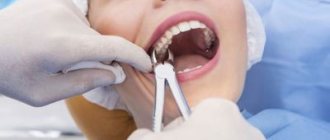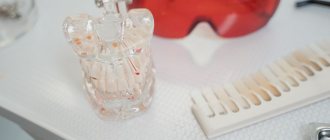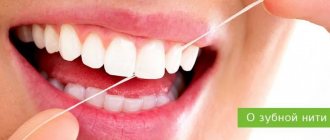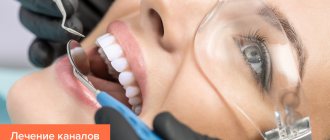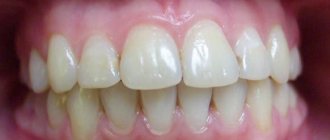At the Line of Smile dental clinic there is no clear policy not to operate on “these days.” But we always try to take into account the cyclical nature of women’s physiology, since surgery during menstruation can negatively affect further wound healing. Therefore, it is important for the client to be honest during the consultation with the doctor and not be embarrassed to ask to reschedule the planned operation. However, if an x-ray shows that there is an infectious focus, removal is carried out on an emergency basis, regardless of what day of the menstrual cycle we are talking about.
Why is it undesirable to have surgery during menstruation?
When planning an extraction, a highly qualified dentist always finds out what stage the woman is in her menstrual cycle. Why is he asking this? It's simple. The quality and composition of the blood directly determines the effectiveness of the anesthesia used and the rate of formation of a blood clot in the socket.
On menstrual days, blood clotting is significantly reduced. That's how it should be. Its composition also changes. Therefore, whenever possible, planned surgical intervention is postponed to “safer” days of the cycle.
Contraindications to the procedure
For some symptoms during the menstrual period, extraction is not done:
- severe abdominal pain, due to which you have to take painkillers;
- nausea;
- low blood pressure;
- heavy periods (heavy bleeding);
- dizziness.
If you feel unwell, surgical intervention will only worsen the problem. The likelihood of complications also increases, and pain after the anesthetic wears off can be excruciating.
Dental diagnoses in which periods are not a hindrance
If you doubt whether it is possible to remove a tooth during menstruation, contact your dentist. If the doctor deems it necessary, he will postpone the operation until later.
Indications for emergency intervention are:
- Severe inflammation, a purulent process that can provoke the development of an abscess, phlegmon, infection of the maxillary sinuses, osteomyelitis.
- A retracted (not fully erupted) wisdom tooth that is completely or partially hidden under the gum tissue/bone. It should be removed as soon as possible if a woman suffers from severe pain, swelling and swelling of the cheek.
- A tooth root fracture resulting from an injury.
- An advanced form of periodontal disease, when it is no longer possible to save the unit.
The specialists at the Line of Smile dental clinic never prescribe removal if it is possible to do without it. They always try to save the diseased tooth and prevent its further loosening and loss. If the roots are in good condition, a pin is installed in them, onto which the crown is fixed on top. Surgery is a last resort.
The need for a removal procedure
In some situations, delaying tooth extraction is not advisable and even dangerous. Severe inflammation increases the likelihood of developing sinusitis, otitis, osteomyelitis, sepsis and other dangerous diseases.
Indications for removal on critical days:
- acute pain that is poorly relieved by medication;
- severe swelling, swelling of the cheek;
- purulent inflammation: periodontitis, cyst and other pathologies;
- toothache accompanied by fever;
- acute pulpitis;
- tooth root fracture;
- impacted “figure eight”, which causes severe pain and swelling.
Menstruation does not become an obstacle if a woman is planning a business trip or vacation in the coming days. It is better to solve the problem in advance than to suffer from pain, postponing treatment until you return.
When to delay deletion
Any planned surgical intervention can be postponed for a couple of days until the menstrual bleeding stops.
So, you can wait if you need to delete:
- dystopic tooth located out of place;
- units that impede the implementation of prosthetics and the installation of orthodontic structures;
- wisdom teeth, which constantly injure the gums and mucous membranes of the oral cavity, cause chronic injuries and inflammation.
Chronic diseases often worsen on the eve of menstruation. This is due to a decrease in immune defense. If a woman knows that after menstruation she needs to go to the dentist and have a tooth removed, she should be especially careful about her health so as not to catch a cold. Otherwise, the procedure will have to be postponed indefinitely.
In what cases is it better to postpone extraction?
Tooth extraction is a last resort when therapeutic treatment is impossible or does not bring a positive effect. If there is no serious inflammation, then the date of the planned operation can be postponed by several days.
Removal can be delayed for the following indications:
- extensive caries without an inflammatory process;
- dystopic teeth;
- extraction of dental units for further prosthetics.
If the operation has been postponed, then during menstruation you need to protect yourself from colds. Since immunity decreases during this period, you can easily get sick with acute respiratory infections. In case of acute respiratory diseases, removal is not performed, which means you will have to wait for an indefinite period of time.
Use of anesthetics
All surgical procedures are performed by Smile Line doctors using highly effective modern anesthetics. This guarantees the absence of pain during tooth extraction and makes the procedure as comfortable as possible.
Usually, when working with the first to fifth teeth, infiltration anesthesia is used. The dentist gives an injection, after which a separate area of the oral cavity “goes numb” and becomes insensitive. If it is necessary to pull out the sixth, seventh or eighth molar, the roots of which are very large and deep, they resort to conduction anesthesia.
Why is it better not to treat teeth on critical days?
There are three reasons to postpone visiting the dentist until the end of your menstrual cycle.
1 reason. Blood clotting disorder. On critical days, a woman’s blood vessels dilate. If a tooth is removed during this period, it can lead to heavy bleeding, which only a doctor can stop.
Reason 2. Reduced pain threshold. Before menstruation, the female body produces prostaglandins. These are the hormones that start the process of menstruation. Thanks to them, the uterus contracts, its inner lining peels off and blood is released. Because of these hormones, a woman experiences pain and experiences any unpleasant sensations more intensely.
Reason 3. Risk of inflammation. During menstruation, blood clots more slowly than usual. Therefore, the holes in the oral cavity take several times longer to heal. The immune system is weakened and the body is vulnerable to infections. If a bacteria or virus enters an open wound, gum inflammation will begin.
Note. If on critical days a woman does not experience pain, discomfort and other unpleasant sensations, then dental procedures may not be tolerated. But you need to warn your dentist in any case.
Precautions after treatment
If the procedure is performed on menstruation, the dental surgeon tells the patient about possible complications and gives detailed instructions on how to behave to avoid them. To minimize the risk of bleeding, you should stop smoking a few days before surgery. This will have a positive effect on blood clotting. Also the day before, you need to exclude coffee-containing drinks from your diet, reduce the intensity of sports training, and avoid hypothermia and overheating of the body.
Immediately after removal, you need to spend about an hour in the clinic so that the doctor can make sure that a dense clot has formed in the hole. It is not recommended to go to work on the day of the procedure. The best option is to go home and rest.
It is extremely important to follow all medical instructions and take prescribed medications. If your body temperature rises, the wound begins to bleed, your health deteriorates sharply, dizziness and nausea appear, you should immediately seek medical help.
There is no need to rinse unless prescribed by your dentist. You should also not touch the hole with your tongue. This can lead to the clot breaking off and opening the wound, causing re-bleeding. In addition, an uncovered hole is a gateway for infection.
Only a doctor can clearly answer the question of whether it is possible to remove a tooth during menstruation. In our dentistry, experienced surgeons perform tooth extraction. We do everything possible to ensure that our patients become healthy as quickly as possible.
What changes occur in a woman’s body during menstruation?
Is it possible to treat teeth during menstruation?
There is no clear answer to this question. Some dentists recommend rescheduling a visit to the doctor, others suggest focusing on the patient’s well-being. Most often, the session can be postponed, but this does not apply to emergency cases when the person’s future health depends on the operation. Dental treatment on critical days is stressful for the female body. During menstruation, physiological and chemical changes occur in a woman's body, as a result of which her general health deteriorates, her pulse slows down and her blood pressure decreases. Because of this, the patient may experience aggravation of various chronic diseases, for example: diabetes, asthma, gastritis, cystitis, endometritis. If such diseases are present, dentists may refer the patient for consultation to doctors of other specialties.
Dental treatment at the TopSmile clinic
Get an individual consultation with a specialist in our clinic and find out whether it is worth treating your teeth during menstruation
Get acquainted with the service
When you need to treat your teeth even on critical days
The TopSmile aesthetic dentistry clinic has many products for removing teeth in emergency situations, including during menstruation. Before the procedure, the doctor will give medications that will increase blood clotting and conduct computer anesthesia without syringes or injections.
Treatment should not be delayed if the patient:
- purulent inflammation: periodontitis, cyst;
- acute toothache;
- swelling or swelling of the cheek;
- tooth root fracture as a result of trauma;
- acute pulpitis;
- an impacted wisdom tooth that causes pain or swelling.
Note. Particularly dangerous symptoms are fever, bleeding and pus in the gum pockets and mouth. If pus gets inside, the infection will spread through the blood throughout the body, which can lead to the development of sepsis.
What procedures are allowed during menstruation?
There are dental procedures that can be performed without harming your health during menstruation. These include fillings, x-rays, teeth cleaning and whitening. At certain stages of treatment, even prosthetics are allowed.
Installation of a filling. A filling can be placed in a session on any day of the menstrual cycle. The procedure is painless, does not involve excision of tissue, and is sometimes performed without anesthesia. Menstruation does not affect the results. The filling will take root and will not change shape or color.
X-ray. X-rays act locally - on the area of the gum where the diseased tooth is located. The patient's pelvis is protected with a special coating. Due to the fact that the image is taken quickly, the flash of waves is so short-lived that it is not capable of causing harm to the patient. The doctor will perform all procedures in one place - at the dental chair. This means you don't have to move from one office to another to take a photo.
Prosthetics. The procedure can be performed if the orthodontist does not intend to place a pin for the implant. Hormonal imbalance and the production of prostaglandins can cause foreign body rejection. But in this situation, the doctor can prepare or adjust the prostheses for the patient.
This is a completely painless procedure that does not require anesthesia. The possibility of damage to oral tissues is virtually eliminated. The TopSmile clinic uses a gentle Swiss EMS ultrasound system. Thanks to it, it is possible to remove soft plaque, hard deposits and dark stains from the surface of the teeth without the risk of injury and enamel cracks. After polishing with brushes and pastes, the teeth will become smooth and shiny, and a protective layer will form on their surface that will repel new stains.
What are the risks and complications?
Most often, menstruation does not have any effect on the quality of dental procedures. However, the likelihood of certain complications and risks increases. This must be taken into account before deciding to carry out or postpone the operation.
It should be remembered that during menstruation, some women use painkillers. When combined with anesthesia, they can cause unwanted side effects.
Due to the high levels of the hormone prostaglandin in the blood, women feel pain more acutely, and due to blood loss, they experience nausea and weakness. Together, this can lead to fainting and high blood pressure.
Due to a weakened immune system, even the smallest cut can cause infection. As a result, after tooth extraction, the patient will have to treat gum suppuration.
TopSmile Clinic guarantees the safety of patients even on special days. We sterilize instruments in several stages, use premium consumables, half of which are disposable, monitor blood pressure during procedures and take into account all chronic diseases of the patient. We always keep in touch with the patient after surgery. The patient can always call the attending physician, and he will see him at any time of the day.
Wisdom tooth removal
Wisdom teeth are considered full-fledged elements of the oral cavity. They are involved in chewing food (if they are located above each other and have contact), and can act as a support for bridges and removable dentures in the future. There are specific indications for extraction in their case. For this reason, the decision about whether wisdom teeth need to be removed is made only by the attending physician.
The most common problem with eighth teeth is their growth. Only some teeth form and grow completely without complications, but often these processes are accompanied by a number of difficulties:
- semi-retinated or impacted elements that have formed in the bone tissue, but have not erupted or only partially erupted. Their position can be vertical, horizontal, or with their roots outward. Because of this, neighboring elements suffer, constant pain appears;
- violation of position (dystopia). Since wisdom teeth erupt without predecessors (baby teeth), and the jaw bone is already formed and does not develop, the position of the elements is often incorrect. They injure the mucous membrane, overlap other crowns, and put pressure on neighbors. This leads to inflammation. The doctor will determine whether the position can be restored with orthodontic treatment or whether it is better to remove the wisdom tooth;
- appearance of a gingival hood. When slowly cutting through the mucosa, an area is formed in which bacteria and food debris accumulate, which are difficult to clean. This leads to acute inflammation, which can provoke the appearance of pus;
- destruction, caries. Elements may appear immediately underdeveloped with carious lesions.
The doctor determines whether wisdom teeth should be removed or not based on complaints and the clinical picture. Problems with even one or two teeth interfere with the normal functioning of the entire dental system. Pain appears when opening the mouth and chewing. The bite and position of the incisors may even change.
How a wisdom tooth is removed depends, as in the case of permanent elements, on the condition of the dental system. In the absence of contraindications, manipulation is carried out with ordinary forceps.
Whether it is painful to remove a wisdom tooth depends on the presence or absence of purulent formations. If they are present, then the painful sensations may persist even after pain relief. Most often, classical infiltration anesthesia is used, which covers a large area and maintains the effect for a long time.
Methods of dental treatment
No patient can be immune from microtrauma during treatment. The dentist needs to be notified in advance about your state of health, so that in an emergency he understands exactly how to provide first aid.
The most popular procedures performed in dentistry are fillings, x-rays, and prosthetics. All this can almost always be postponed until there are no contraindications.
Sealing
Most dentists are of the opinion that dental fillings during menstruation are possible. The material used for the filling will definitely not be rejected later.
You can have teeth filled during menstruation
If second-degree caries develops and the use of anesthesia is necessary, treatment during menstruation is not recommended. Contraindications include taking antibiotics and using drainage.
Menstruation and prosthetics
Prosthetics is a complex procedure; the doctor and the patient will have to meet more than once. During critical days, you can take an impression, as well as perform all the preparatory steps. Restrictions do not apply to the installation or fitting of prostheses.
However, due to the fact that immunity decreases during menstruation, the foreign body may be rejected. That is why it is better to install an implant, namely screwing a pin into the jaw bone, after the time is favorable for this.
X-ray of a tooth
An X-ray of a tooth can be taken on any day of the menstrual cycle. The procedure is instant, special protection is put on the body, and the beam is directed exclusively to the root site. There will be no harm to the patient's health.
If necessary, x-rays can be taken
Teeth cleaning
Ultrasound used during cleaning does not harm the body. The procedure can be carried out absolutely any day.
Tooth extraction and menstruation
This is a stressful surgery. During this period, the body becomes weakened, and even a minor cut on the gum can lead to infection.
Depending on various situations, the following complications may occur after tooth extraction:
- bleeding lasting more than ten minutes;
- infection, development of inflammatory processes.
If pain occurs, regardless of whether you are menstruating, you should seek help from the hospital.
Why you can’t have teeth removed during your period, when you need to go to the hospital, you can read the answers to these and many other questions just above. But in any case, all advice is only a recommendation, and the final decision can only be made by the attending physician.
If teeth have not erupted
When wisdom teeth are inside the jaw bone in a “sleeping” state, they can be seen in the picture. Their position is also visible in the picture.
If the teeth are positioned vertically, there is a chance that they will erupt without causing much discomfort or moving neighboring teeth. Then, most likely, they will not interfere with the process of correcting the bite. It often happens that during the treatment process, there is more space in the row of teeth, and wisdom teeth immediately begin to erupt.
Sometimes wisdom teeth are located at an angle or even almost horizontally.
A variant in which wisdom teeth can harm other teeth
In this case, most likely, they will not erupt. And if the growth process does begin, then you can expect, at a minimum, pain and inflammation, since these rather large teeth will put pressure on the surrounding tissues and on the roots of other teeth.
For orthodontic treatment, both options carry a certain risk. In this case, the decision must be made in preparation for treatment - at the diagnostic stage.
- If the eighth teeth do not look problematic, are located vertically, there is no great crowding of other teeth, the teeth are not very large - there is an option to start treatment without removing them, and just observe.
- If the patient’s dentition is severely narrowed, the teeth are naturally large, and the figure eights are positioned incorrectly and can move the roots of adjacent teeth when they erupt—you may have to decide to remove the teeth (or some of them).
In the second case, the doctor needs to foresee not only the course of treatment, but also how the retention stage will proceed. After all, wisdom teeth may begin to erupt even after treatment. Will there be enough space for them, will they move their teeth, thereby destroying the achieved result? This also happens.
